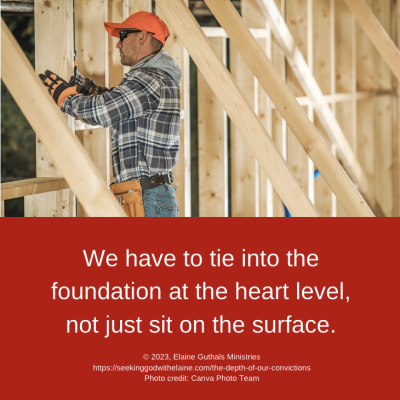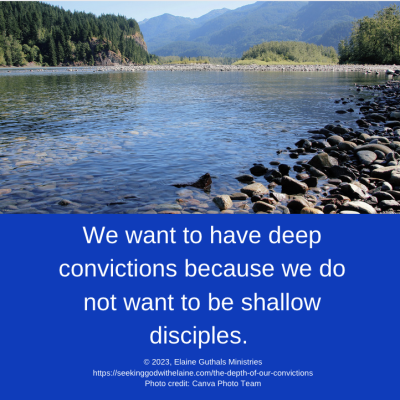God isn’t interested in us just knowing about Him. This devotional reading looks at the depth in which we must be convicted.
Nuggets
- Our convictions can’t be at the surface level but must rather be at the heart level.
- Inward religion comes from a deep conviction of God’s saving power.

In the last devotion, we started the series of Getting Religion in our Outward and Inward Religion study. We talked about how people have different expectations on how to get there.
The way we must come to believe in Jesus as our Savior and God as Sovereign Lord is to ensure we have the correct depth of conviction.
Let's Put It into Context
To read devotions in the Habitual Holiness of Heart and Life theme, click the button below.
Here is a running list of nuggets for the theme.
Devotions in the Outward and Inward Religion study
Here is a running list of nuggets for the study.
We are using Boston’s sermon as the foundation for this series.
Resource
Depth of Conviction and Humiliation
“Everyone who comes to me and hears my words and does them, I will show you what he is like: he is like a man building a house, who dug deep and laid the foundation on the rock. And when a flood arose, the stream broke against that house and could not shake it, because it had been well built. But the one who hears and does not do them is like a man who built a house on the ground without a foundation. When the stream broke against it, immediately it fell, and the ruin of that house was great” (Lk. 6: 47-49 ESV)
Our convictions can’t be at the surface level but must rather be at the heart level.
I know we’ve talked about these verses before, but this is an interesting lens through which to be looking at them. We haven’t talked depth before.
We have to have depth of conviction. Keach explained that conviction encompasses faith, repentance, regeneration, self-denial, and walking in the Spirit.
Resource
Faith is a gift from God and a work of the Spirit that enhances the conviction that the doctrines revealed in God’s Word are true, even if we do not understand all aspects of them, a belief which impacts our lives and distinguishes us from others.
Repentance is acknowledging our separation from God and expressing sorrow for breaking God’s laws and commandments by making the commitment to change our sinful ways to ways of righteousness through obedience.
- Sin is not believing that Jesus is our Savior to save us from our actions by humans that disobey God and break one of His reasonable, holy, and righteous laws and commandments, goes against a purpose He has for us, or follows Satan’s promptings.
- Holy means to be set apart — because of our devotion to God — to become perfect, and morally pure while possessing all virtues and to serve and worship God.
- Perfection means we reach a state of maturity because the combination of the spiritual graces form, when all are present, spiritual wholeness or completeness — holy, sanctified, and righteous.
- Spiritual graces are worldly morals that have been submitted to God to further His kingdom instead of enhancing this world.
- Sanctified means to be set free from sin.
- Righteous means we are free from sin because we are following God’s moral laws.
- Pure means not being sinful or having the stain of sin.
- Virtues are standards of moral excellence.
- Perfection means we reach a state of maturity because the combination of the spiritual graces form, when all are present, spiritual wholeness or completeness — holy, sanctified, and righteous.
- Holy means to be set apart — because of our devotion to God — to become perfect, and morally pure while possessing all virtues and to serve and worship God.
- Obedience means submitting ourselves to the will of God as it is presented to us and living our lives accordingly.
Regeneration is being changed from spiritually dead to spiritually alive and the internal new birth and requickening that God brings about through the work of the Holy Spirit to give us new character.
- Spiritual death is the separation from God that occurred as a consequence of Adam and Eve’s original sin.
- The spiritually alive are those who have ABCDed, so they are no longer separated from God.
Self-denial is the giving up anything that is contrary or in competition with that which Jesus teaches or calls us to do.
Glossary
The ABCDs of Salvation
If you have not become a believer in Christ, please read through the
Plan of Salvation and prayerfully consider what God is asking you to do.
A – admit our sins
B – believe His Son Jesus is our Redeemer
C – confess God as Sovereign Lord
D – demonstrate that commitment by making any changes needed in our lives to live the way in which God has called us
The Disciple’s Job Description
It all boils down to the depth of our conviction that sin is evil. If we don’t think sin is wrong or that something is a sin, we won’t have the depth of conviction need to have.
We also have to have depth of humiliation. No, we aren’t talking about how embarrassed we are going to be.
Yes, we may be personally mortified, but we have to mortify our sins. Mortify means to place a death penalty on our sins.
Glossary
This ties into what we were talking about in the last devotion. Being a disciple for Christ is going to cost us.
Spurgeon put it this way. He wrote, “But when that man is put on the road to heaven it will cost him something. It will cost him earnestness to knock at the wicket-gate, and sweat wherewith to climb the Hill Difficulty; it will cost him tears to find his roll again when he has lost it in the [arbor] of ease; it will cost him great care in going down the Valley of Humiliation; it will cost him resistance unto blood when he stands foot to foot with Apollyon in conflict.”
Resource
About what are we being humble? We have to believe what God says is right — regardless of our own opinions and experiences.
He is Sovereign God. He is our Creator. What He says goes.
We have to deny what we want and think to embrace God’s reality — because His reality is the only one that counts.
This depth of humiliation can be accomplished. Jesus did it.
It is a matter of choice. We talked before about how both builders heard the God’s Word.
One chose to accept Christ as foundation. One didn’t.
Isn’t that what this whole parable is about? It isn’t about believers and non-believers.
It is about believers not being Matthew 7: 21 believers. We have to tie into the foundation at the heart level, not just sit on the surface.

Deeper Plowing
“Other seeds fell on rocky ground, where they did not have much soil, and immediately they sprang up, since they had no depth of soil, but when the sun rose they were scorched. And since they had no root, they withered away” (Mt. 13: 5-6 ESV)
“As for what was sown on rocky ground, this is the one who hears the word and immediately receives it with joy, yet he has no root in himself, but endures for a while, and when tribulation or persecution arises on account of the word, immediately he falls away” (Mt. 13: 20-21 ESV)
Inward religion comes from a deep conviction of God’s saving power.
Boston elaborated on how to get conviction. He wrote, “The plough of conviction lightly going over the fallow ground of the heart is sufficient to make an outside Christian (Matthew 13:5, 20). But it must be carried deeper to make an inside Christian, even to the root of the most inward beloved lust, and to the discovery of Christ for sanctification, as well as justification.”
Resource
Reading the verses in Matthew gives us a great piece of insight. There wasn’t much soil because of the rocks present.
Keach told us three important things about this. There was soil there but not enough.
We know that a little faith can go a long way. “… ‘For truly, I say to you, if you have faith like a grain of mustard seed, you will say to this mountain, “Move from here to there,” and it will move, and nothing will be impossible for you’” (Mt. 17: 20 ESV).
But that little bit gets us salvation. We know after that we have to navigate sanctification.
Salvation is the gift of life through the deliverance from condemnation and sin to acceptance and holiness and changes us from being spiritually dead to spiritually alive.
- Holiness is the transcendent excellence of His nature that includes elements of purity, dedication, and commitment that lead to being set apart.
- Purity means possessing God’s moral character, having eliminated the stain of sin.
Sanctification is the transformational process of the mind, body, and soul, which begins with regeneration; gradually changes our nature and morals through the promptings of the Holy Spirit; and ends with perfected state of spiritual wholeness or completeness.
Glossary
We start out as milk babies. Our goal is to get to be steak adults.
To read a related devotion, click the button below.
We get there by Keach’s other two important things. They are moisture and root.
Resource
The moisture is us seeking God. The roots are the depth of our convictions.
Using the moisture is how we get to the root. We have to know God’s Word by hearing, studying, and meditating on it.
Searching for and Seeking God
Hearing His Word (Rom. 10: 17).
Reading His Word (Rev. 1: 3).
Praying to Him (Heb. 4: 16).
Studying His Word (Ac. 17: 11).
Meditating on His Word (Ps. 1: 1-2).
Memorizing His Word (Ps. 119: 11).
But we have to accept and confess what God is telling us. “because, if you confess with your mouth that Jesus is Lord and believe in your heart that God raised him from the dead, you will be saved” (Rom. 10: 9 ESV).
The depths of our convictions are so deep, the joy bubbles out of us. That joy leads to witnessing and fearing fruit.
We want to have deep convictions because we do not want to be shallow disciples. We don’t want to be superficial.

Making the Connections
The key to gaining the depth needed is to not be ignorant. Oh, it isn’t that we have just heard what Jesus is saying to us.
We have to understand to the level that God reveals it to us and accept it at a deep level of conviction.
We have to understand we need Jesus as our Savior and Redeemer. We must not only be sorry for our sins but also turn away from committing them again.
Keach told us exactly what we are supposed to do. He wrote, “It is to believe whatsoever is matter of faith; and to do and [practice] whatsoever is matter of practice and duty.”
Resource
We have to put our whole faith, trust, and dependence on Jesus. It is all about obedience.

How Do We Apply This?
- Love Christ above all.
- Mortify the sins of the flesh.
- Deny ourselves, take up our crosses, and follow Him.
- Imitate Jesus.
- Surrender all to Jesus.
- Count the cost of being a disciple.
Resource
Father God. We don’t want our faith in You just to be on the surface. We want it to be at the heart level, totally rooted and grounded in You. Amen.
What do you think?
Leave me a comment below (about this or anything else) or head over to my Facebook group for some interactive discussion.
If you don’t understand something and would like further clarification, please contact me.
If you have not signed up for the email providing the link to the devotions and the newsletter, do so below.
If God has used this devotion to speak with you, consider sharing it on social media.